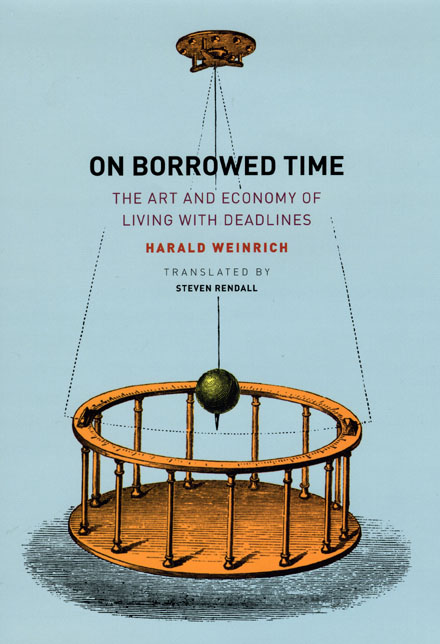Writing on deadline
 Each day is another deadline. Then there is that ultimate deadline at the end of our lives. Our sense of the passage of time, and how our experience is shaped by the complexities of multiple deadlines, is the subject of Harald Weinrich’s book, On Borrowed Time: The Art and Economy of Living with Deadlines. John Gilbey reviewed the book for the Times Higher Education:
Each day is another deadline. Then there is that ultimate deadline at the end of our lives. Our sense of the passage of time, and how our experience is shaped by the complexities of multiple deadlines, is the subject of Harald Weinrich’s book, On Borrowed Time: The Art and Economy of Living with Deadlines. John Gilbey reviewed the book for the Times Higher Education:
Any tome that starts with a discussion of Hippocrates, Socrates, and Plato and ends with an analysis of the 1998 film Run Lola Run has to be worthy of closer study. This one does not disappoint.
Weinrich gives himself a very broad canvas—the impact that shortness of time has had on humanity across history—and he fills it well. He uses an unhurried, easy, and assured narrative style to tease out the complex nature of how we perceive time in natural and contrived situations.
Gilbey goes so far as to venture:
I believe that the structure and style of this book would lend itself well to being adapted for the screen, either as a single banquet or as a selection of very tasty snacks. If there is anyone out there looking to produce a high-quality, slightly quirky philosophical programme with a recognisably European flavour, then I strongly suggest that you take a look at this book and seek to secure the rights.
Rights of course can be sought through our Rights Department.
Conveniently, Times Higher Education served up quite a spread of Chicago books in their latest issue. The repast also includes:
Margaret Linley reviews The Victorian Eye: A Political History of Light and Vision in Britain, 1800-1910
Howard Segal reviews Republic of Drivers: A Cultural History of Automobility in America
Peter J. Smith reviews Tudor Autobiography: Listening for Inwardness
and Caroline Bruzelius reviews Believing and Seeing: The Art of Gothic Cathedrals